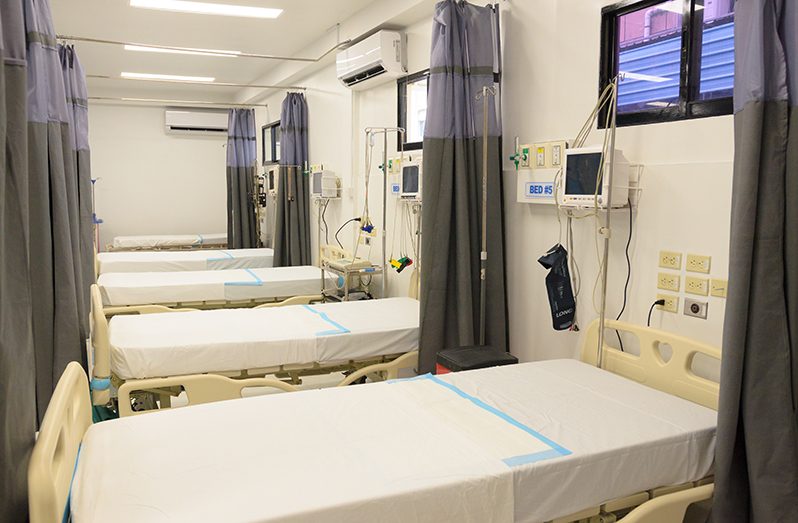THE Diamond Diagnostic Centre which serves the heavily populated East Bank Demerara corridor is set to be reopened for full operations on Monday, following months of renovations aimed at transforming the facility into one that is energy-efficient, and climate-resilient.
The upgraded ‘SMART’ hospital was officially recommissioned during a simple ceremony hosted on Saturday in the hospital’s compound. During his feature address, Minister of Health Dr. Frank Anthony said that similar conversions of local hospitals are directly linked to the government’s fight against climate change, having recognised the detrimental impact that poor environmental practices have on human health.

The ‘SMART Hospital’ concept refers to a facility that is both safe and ‘green’. The efforts to transform local hospitals are being facilitated under an $835M (US$4.175 million) project, funded by the United Kingdom’s Department for International Development (DFID).
With the upgrades, the Diamond Hospital now boasts of the requisite infrastructure to guard against flooding, reduce reliance on the Guyana Power and Light (GPL) Corporation by resorting to renewable energy, and enabling the use of rainwater for its day-to-day functions.
“This hospital would be manned by 58 nurses and we have 20 doctors,” Dr. Anthony disclosed. He said that the upgrading of hospitals mitigates the need for persons to rely on the Georgetown Public Hospital Corporation for key services such as surgeries and x-rays, etc.
The other institutions currently being upgraded include the Leonora Cottage Hospital in Region Three; the Mabaruma Hospital in Region One (Barima-Waini); Paramakatoi Health Centre in Region Eight (Potaro-Siparuni); and the Lethem Regional Hospital in Region Nine (Upper Takutu-Upper Essequibo).
Dr. Anthony said that within the next few years, the People’s Progressive Party Civic (PPP/C) will be looking to convert all the health facilities in Guyana.
“We have already done the assessment of 89 other health facilities,” the minister posited.
In explaining the importance of the SMART hospital project, Dr. Anthony made specific reference to reports released by the United Nations’ Inter-Governmental Panel on Climate Change (IPCC), particularly as it relates to the notable rise in global temperatures.
“For the last hundred years, the earth’s temperature has increased by 0.75 degrees Celsius and every decade since 1850, we are living in warmer climate,” the minister said, pointing to the consequences of Guyana’s infamous 2005 floods.

In a series of articles published in January, the Guyana Chronicle examined a number of adverse effects that climate change is likely to have on local sectors, including sea defence, health and food production, all due to the projected rise in sea levels.
As a matter of fact, the IPCC predicts that “global warming will worsen human health conditions, especially in tropical regions.” In countries such as Guyana, an increase in temperature indicates an increase in mosquito populations, thereby escalating the risk of a variety of insect-borne infections.
“…and those mosquitos would bring with them, a number of different types of diseases such as dengue and malaria, and chikungunya, and so forth,” Dr. Anthony previously said in an invited comment.
In addition to vector-borne and water-borne diseases, global warming also paves the way for increased heat waves, which would result in prolonged periods of abnormally high temperatures that can have serious health effects on vulnerable populations, such as the elderly and the sick.
“This was already seen during the 2003 heat wave in Europe, which claimed approximately 35,000 lives,” a recent UN Climate Change report indicated.
The IPCC further predicts that global warming will lead to hot days, followed by nights of high temperatures, which can result in persons developing potentially fatal hyperthermia or heatstroke.
Additionally, “People suffering from heart problems are more vulnerable to increased temperatures, especially those living in already warm areas, as their cardiovascular system must work harder to keep their body [sic] cool,” the report indicated.
It explained too that, “Hot temperatures increase the ozone concentration, which can damage people’s lung tissue and cause complications for asthma patients and those with lung diseases.
“Increased global warming can also pose a threat to national security, affecting food security, which, in turn, can lead to resource conflicts,” the report noted.
Reflecting on the many environmental tragedies that occurred in 2020, Guyanese Scientist Dr. Michelle Kalamandeen, had told the Guyana Chronicle that climate change has inevitably created the deadly monster that is the novel coronavirus.

In a previous interview with this newspaper, the biologist expressed confidence that the emergence of the COVID-19 is a consequence of global administrations ignoring, and, by extension, failing to address the critical connection between the environment and human health. She explained that three out of every four new infectious diseases in people come from animals.
“More specifically, from our wildlife and from the livestock we keep in ever-increasing numbers…if an area becomes too hot or too cold for certain wildlife, they will migrate to new places, where they interact with other animals that they have never encountered before,” Dr. Kalamandeen had explained.
She reasoned that this usually results in humans increasingly sharing the same spaces and vying for the same food as various species of organisms, thereby increasing the risk of transmission of diseases from animals to humans.

Minister Anthony gave the assurance that the Low Carbon Development Strategy pioneered by former President Bharat Jagdeo, remains a component of the PPP/C’s operations and that the administration remains committed to protecting the environment.
The Health Minister had previously indicated also that his ministry is currently working to craft a comprehensive 10-year strategic plan which seeks to examine a plethora of ways that the ministry can respond to climate change.
“…and our preparedness in terms of health response to things like pandemics and flooding and so forth…we want to ensure that we build that capacity to respond to [the] effects of climate change, and try to make our systems more climate-resilient,” Dr Anthony asserted.





.jpg)








